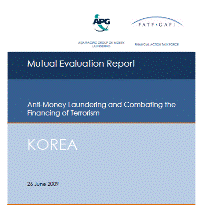The Financial Action Task Force (FATF) and the Asia/Pacific Group on Money Laundering (APG) have jointly conducted an assessment of the implementation of anti-money laundering and counter-terrorist financing (AML/CFT) standards in the Republic of Korea (Korea). The key findings of this evaluation are:
- Korea has demonstrated political commitment, and commitment by government agencies and the private sector, to anti-money laundering (AML) efforts since the mid 1990s.There have been no confirmed cases of terrorist financing (TF) in Korea to date. Korea’s counter-terrorist financing (CFT) system is new, coming into effect in December 2008, and it could be further strengthened.
- Korea does not have structured organised crime syndicates, but rather has ‘brotherhoods’ which are primarily involved in online gambling, loan-sharking, extortion and prostitution. The most prevalent offences in Korea are fraud; theft; forgery; and, copyright and trademark violations.
- The most common money laundering (ML) techniques involve cash transactions and accounts in other persons’ names.
- The ML offences are largely in line with international requirements but penalties available and applied are not sufficiently effective, proportionate or dissuasive and there is a lack of focus on ML investigations. The confiscation regime is sound but, given the size of the economy and the risk of money being laundered in Korea, the number of confiscations each year and the value confiscated is low.
- The Korea Financial Intelligence Unit (KoFIU), is Korea’s financial intelligence unit (FIU) and the lead agency in Korea for AML/CFT matters. The Korean AML/CFT system is heavily reliant on KoFIU’s work on financial intelligence, AML/CFT supervision, training of obliged entities, policy, reform, national co-ordination and international co-operation.
- Customer identification and verification represents a strength in the Korean preventive measures but issues such as beneficial ownership, politically exposed persons and correspondent banking have yet to be addressed. In addition, the obligation to file suspicious transaction reports (STRs) only applies to transactions over KRW 20 million (USD 17 227).
- The level of sanctions available for breaches of AML/CFT obligations is low and sanctions are not often applied by supervisory authorities. However the compliance culture within Korean financial institutions is very strong.
For further information, journalists are invited to contact the FATF Secretariat tel: +33 1 45 24 90 90, fax: +33 1 44 30 61 37, email: contact@fatf-gafi.org; 2, rue Andre-Pascal, 75775 Paris Cedex 16, FRANCE.
This mutual evaluation was conducted using the FATF Recommendations as published in October 2004, and the 2004 Methodology for Assessing Compliance with the FATF 40 Recommendations and FATF 9 Special Recommendations.


 Twitter
Twitter
 Facebook
Facebook
 Instagram
Instagram
 Linkedin
Linkedin
